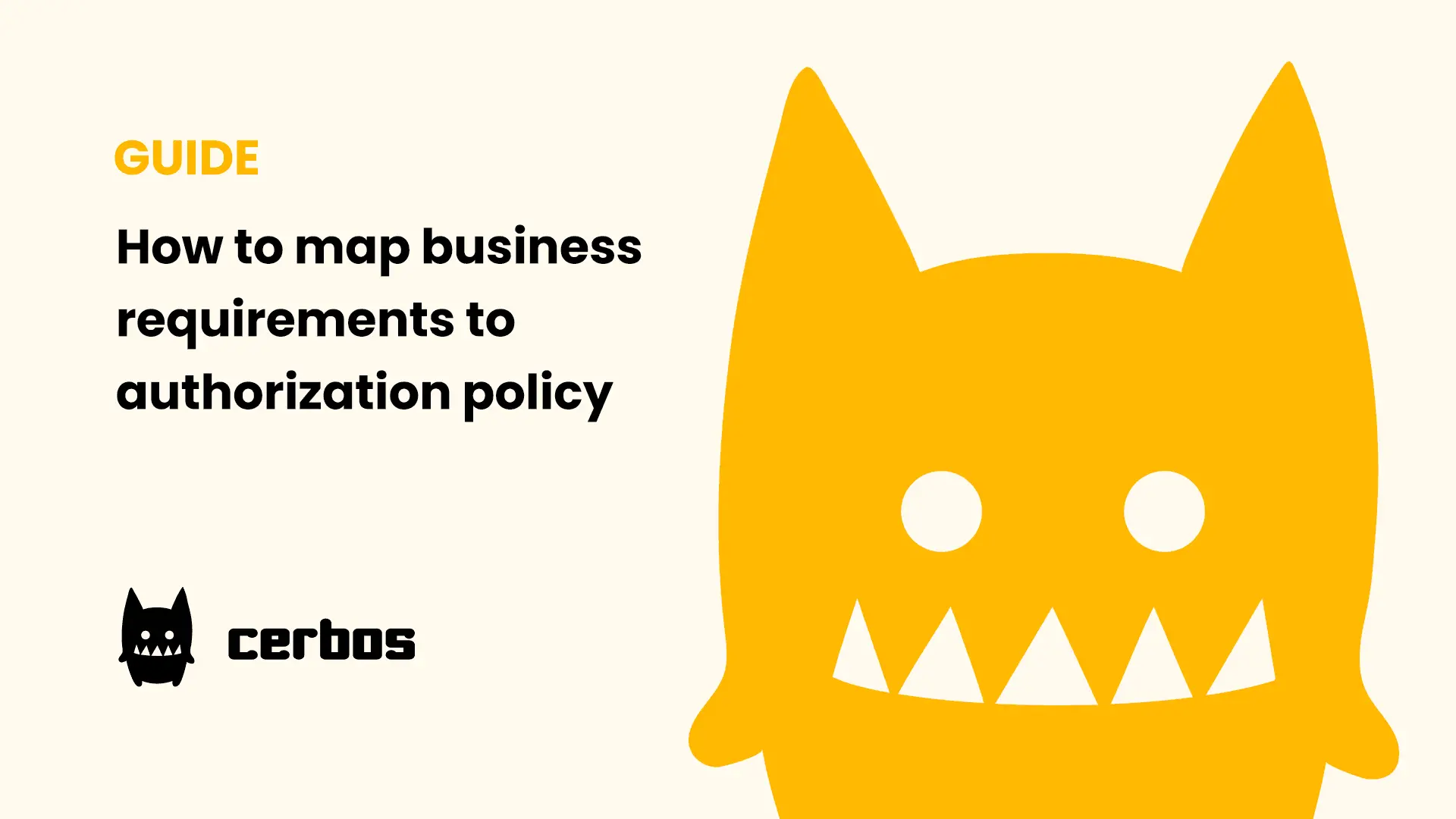Decoupled authorization: Navigating technical challenges and best practices
As the founder of Cerbos, I have first-hand experience with the challenges that CTOs face when building software solutions that meet immediate requirements while also future-proofing their infrastructure. This balancing act becomes particularly challenging when addressing complex authorization requirements in enterprise settings, which is why there are significant benefits to building the correct solution early on.
Large organizations require sophisticated and flexible authorization systems to accommodate diverse roles and access levels. As these companies grow, their authorization needs evolve, making it difficult to anticipate future requirements. Additionally, enterprises face the challenge of managing multiple departments, geographies, and seniority levels, which further complicates the authorization landscape. As organizations scale, the stakes for security, compliance, and performance increase, creating more pressure on CTOs to balance current needs with preparing for future growth.
Why Decoupled Authorization?
Decoupled authorization is an increasingly popular solution in modern software development stacks, enabling developers to manage access control policies independently of the underlying application, providing flexibility, scalability, and maintainability. However, as applications become more complex and interconnected, businesses must prioritize better security practices, reduce development time, and comply with regulations and audits more easily. While avoiding overengineering is a common approach for new builds, it may not be sufficient for future needs.
Decoupled authorization, with its role-based and attribute-based access control (RBAC and ABAC), can help meet more complex requirements as an organization grows. For instance, in a small company, a manager, a user, and an IT admin may suffice for managing access control. However, in a larger organization with thousands of managers in different roles, geographies, and departments, authorization becomes much more complex. As a result, CTOs face the challenge of building a comprehensive system upfront while also rolling out a minimum viable product to get to market quickly. Unfortunately, authorization requests often rank low in terms of priority, making it difficult to allocate resources for their implementation. Decoupled authorization can help overcome these challenges by providing a scalable, secure, and reliable solution that is easy for developers to integrate and understand.
What To Consider When Implementing Decoupled Authorization
It's important to select a solution that meets your application's requirements and can scale with your needs. Consider factors such as ease of integration, performance, flexibility, and support for different access control models. Ideally, the solution should seamlessly integrate with your existing infrastructure, including identity providers, data stores, and messaging systems, to avoid introducing new vulnerabilities or dependencies.
There are various challenges that a development team may face when implementing decoupled authorization:
Ensuring Policies Are Enforced Accurately and Efficiently
An authorization system must be robust, accurate, and perform well under load. It's essential to validate policies before deployment and ensure that they are applied consistently across the application. For example, a development team for a large e-commerce platform must ensure that the decoupled authorization system can handle a high volume of user requests during peak shopping times in order to protect sensitive user data and prevent unauthorized access to restricted resources such as payment information or order management.
Maintaining Policy Consistency Across Multiple Services and Microservices
Maintaining policy consistency across multiple services and microservices can become challenging as applications scale and evolve. Developers must ensure that authorization rules are synchronized and that changes propagate correctly throughout the system. For example, a content streaming platform may use microservices for user management, content catalog, and billing. As new features and services are added, the development team must ensure that authorization policies remain consistent across all microservices.
Dealing With Policy Conflicts and Resolutions
Increasing the number of policies also increases the potential for conflicts. Developers must be able to detect and resolve these conflicts to ensure that the correct access permissions are applied in all scenarios. For example, in a healthcare application, a doctor may have access to their own patients' records, but access to records of patients outside their care may be restricted to emergency situations. In this case, the development team must implement a mechanism to detect and resolve policy conflicts, ensuring that the doctor can access critical information in emergencies but is restricted from accessing other patients' records in non-emergency situations.
Standardise Communication Across the Business
Communicating effectively will allow your business to implement authorization quickly; use clear, concise policies that are easy to understand and maintain. Using comments and descriptive names for variables, functions, and classes helps provide context and improve readability. Periodically review and update access control policies to ensure they remain accurate and reflect the current state of your application; this helps to prevent stale or outdated policies from causing security issues.
Create Robust Testing
Before deploying policies to production environments, extensively test them. Automated testing tools and techniques like unit tests and integration tests can help validate policy behavior and ensure it meets requirements. In addition, implement robust logging and monitoring solutions, such as the ELK stack (Elasticsearch, Logstash, and Kibana) or Splunk, to track authorization activity. Use this data to detect potential issues, analyze trends, and provide evidence for compliance audits.
Decoupled authorization is essential to modern software development, offering flexibility, scalability, and improved security. However, a business must understand and address the technical challenges of decoupled authorization to create robust and maintainable applications. Plan carefully and implement a solution that works for you and your organization; this will help you adapt to changing requirements and regulations more effectively.
Book a free Policy Workshop to discuss your requirements and get your first policy written by the Cerbos team
Recommended content

Mapping business requirements to authorization policy
eBook: Zero Trust for AI, securing MCP servers

Experiment, learn, and prototype with Cerbos Playground
eBook: How to adopt externalized authorization

Framework for evaluating authorization providers and solutions

Staying compliant – What you need to know
Subscribe to our newsletter
Join thousands of developers | Features and updates | 1x per month | No spam, just goodies.
Authorization for AI systems
By industry
By business requirement
Useful links
What is Cerbos?
Cerbos is an end-to-end enterprise authorization software for Zero Trust environments and AI-powered systems. It enforces fine-grained, contextual, and continuous authorization across apps, APIs, AI agents, MCP servers, services, and workloads.
Cerbos consists of an open-source Policy Decision Point, Enforcement Point integrations, and a centrally managed Policy Administration Plane (Cerbos Hub) that coordinates unified policy-based authorization across your architecture. Enforce least privilege & maintain full visibility into access decisions with Cerbos authorization.
